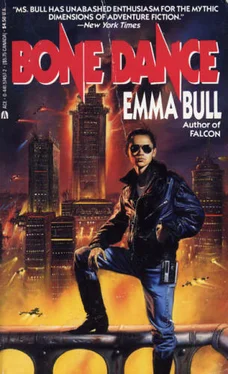“Is this the only way up,” he asked, “or are you doing this for my benefit?”
“You could still find room on the sidewalk for tonight.”
He shook his head, smiling faintly. I didn’t seem to be scaring him.
We ground to a halt on the seventh, and left the box of the elevator. High above the rest of the tenants’ cooking and living, my hallway smelled like decaying building: dusty, dry, abandoned. I fumbled with locks, and opened the door onto the darkness of what had been a reception area. It was an empty room; a last defense against anyone who broke in. Sound bounced off bare walls, the light switch didn’t work—anyone would have concluded that they’d picked the locks for nothing.
I thumbed a box in my pocket that had once opened garage doors, and the bulb lit in the corridor behind the front room. Skinner jumped. “This is it,” I said sourly. “Enter freely and of your own will, and leave something of the happiness you bring.” He laughed. A lot of people wouldn’t have gotten that one, either.
I walked the streak of light from the open doorway and was home. The left-hand room must have held supplies, once; it was just big enough for my wadded-cotton mattress and a chest of drawers. The middle one, which was larger, I’d turned into the living room-and-kitchen. The dormer windows were covered with black felt (a light in the top floor might have attracted attention). I’d hung a sink on one wall, stealing water and drainage from the john beyond it, and had a propane stove on a metal cabinet and an old RV propane/electric fridge next to that. There was a wooden desk that served as countertop and table, and things to sit on, including a leather-and-chrome armchair that looked like a compound slingshot, and a shabby upholstered wing chair. There was also a shelf unit of books, enough to be convincing. I went in and lit the gas lamp over the sink.
Skinner stopped in the doorway, and I watched his gaze go straight to the books. He walked forward and began to read the spines. He touched one now and then, never actually taking a book down. I found myself almost wanting to show him the third room.
“Pale Fire. I haven’t seen a copy…” His eyes and fingers wandered on. “Four Quartets. ‘The Lady’s Not for Burning.’ Oh, God, The Prisoner of Zenda .” Suddenly his drawl thickened to parody. “Land sakes,” he said, “have you read all these?”
My insides gave a leap of anger. He’d betrayed me into a momentary thaw of attitude, only to dump the resulting ice water over my head. Then I recognized the familiar sound of self-ridicule. My books had caused some failure of reserve in him, and he was only repairing the damage. “Have you ?” I asked.
He was a little white-lipped. “Some of them,” he said.
“If you walk off with one, I’ll rebind a few in your hide.”
He ran his thumb down a ragged Britannica spine. “What do I do to get a little slack around here?”
“Sorry, all out of slack.”
He squeezed his forehead between thumb and fingers, which almost hid his face and the turned-up corner of his mouth. “Guess I’ll just get some sleep, then.”
“In here,” I said, and stepped back into the corridor. He followed. I showed him into the little bedroom, and lit the candle on the dresser. “What about you?”
“I’ll sleep in the next room. The sink works like a sink, the icebox works like an icebox—if there’s anything in it; I don’t remember—and the toilet, which is through there, works like a toilet. Whatever you do, don’t smoke in bed, and don’t wake me up.”
I was in the corridor already when he said, “You don’t remember anything that happened last night, do you?”
No. But I never said so to you. “What makes you think that?”
He was standing in the half-open door, that vitreous grin in place, eyes alight and untrustworthy. “Because I do remember.”
“What’s that supposed to mean?”
“Just that I know. You ever want to find out what went on all those times you can’t recall—Just ask me nicely.”
With that, the bastard shut and locked my bedroom door.
I could have broken the door open, I now realize. Or apologized lavishly through it, and begged for an explanation. Under ordinary circumstances, I’m sure I would have. Instead, I stared at the blank wood until the insides of my eyes hurt. Then I walked down the corridor to the third room, the one I didn’t show him, unlocked it, went in, and locked it behind me.
(Mick Skinner knows about last night, said my head.)
The third room was accessible through the false back of a closet. It was the largest of the rooms I called mine. It no longer had windows; sunlight does damage, and the sun, at least, I could stop. The heat, too, though not so thoroughly; the thermometer at the duct from the swamp cooler on the roof showed 78 degrees. This was the only room that wasn’t furnished like a thrift-store campsite. The steel shelving covered most of the wall area, the chair was meant to be sat in for eight hours at a stretch, and the light, when I needed it, was strong and steady. This, after all, was the terminus for the cable that came down from the roof, from the batteries that charged off the windmill disguised as a rusty roof vent.
(Mick Skinner knows what happened to me, said my nerve endings.)
I moved around the room touching things—my talismans, the trappings of my sect. More books: the ones I needed to keep that room working, and the ones that would disappear (and their owner with them) if it were known I had a copy. Thought-contraband in fiction and nonfiction. The video monitor fifteen inches, with three switchable levels of resolution. The record/playback hardware: three videotape decks; a video editing board; three audio cassette decks, one digital; a CD player; an eight-channel reel-to-reel recorder; a turntable, probably used in a radio station; two 120-watt amplifiers from the middle of the last century, probably likewise, but heavily modified for my purposes; a six-channel audio mixer with EQ and other enhancements; two pairs of headphones. And the diamond: a studio-quality recording CD unit and a case of blanks.
(Mick Skinner knows…)
And, of course, the archives. They were mostly copies; I’d sold the previous generation of each one after I’d dubbed it, to collectors rich enough, crazy enough to own something rare and powerful and useless. Then I’d taken the money and spent it on hardware, and on more product, and the media to record it on.
Audio– and videotapes, their mylar bases fragile with age. Vinyl audio disks, brittle as porcelain. Audio CDs, their information becoming vague as if with senility. Two thousand movies, four thousand albums, music and words and pictures like voices whispering from a sweet, sunny past, degrading every time they were played.
It ought to have been depressing—just as every day should be depressing, because it leads to the grave. On bad days I sat in the next room and thought about the value of the plastic tape shells alone to a reprocessor, never mind the mylar, I could be rich… But they were like slaves on an underground railroad, outlaws I hid from the sheriff. Who’d keep them alive, if I abandoned them?
(Mick Skinner knew about…)
I sat in my valuable, comfortable chair and contemplated the possible distractions. I’d found a new CD two days before; I’d check that over. I rolled the chair over to the rack, powered up the CD player, and plugged headphones into the amplified jack. The insert under the scarred plastic of the jewel box was a faded drawing of five bemused-looking people sitting or standing around an immense antique car with a startling paint job. It was only one page, front and back, with a ragged edge—there had been more, once. The name of the group wasn’t familiar. I cleaned the silver rainbow disk, set it in the tray, closed the ‘phones over my ears, and put my feet up.
Читать дальше












